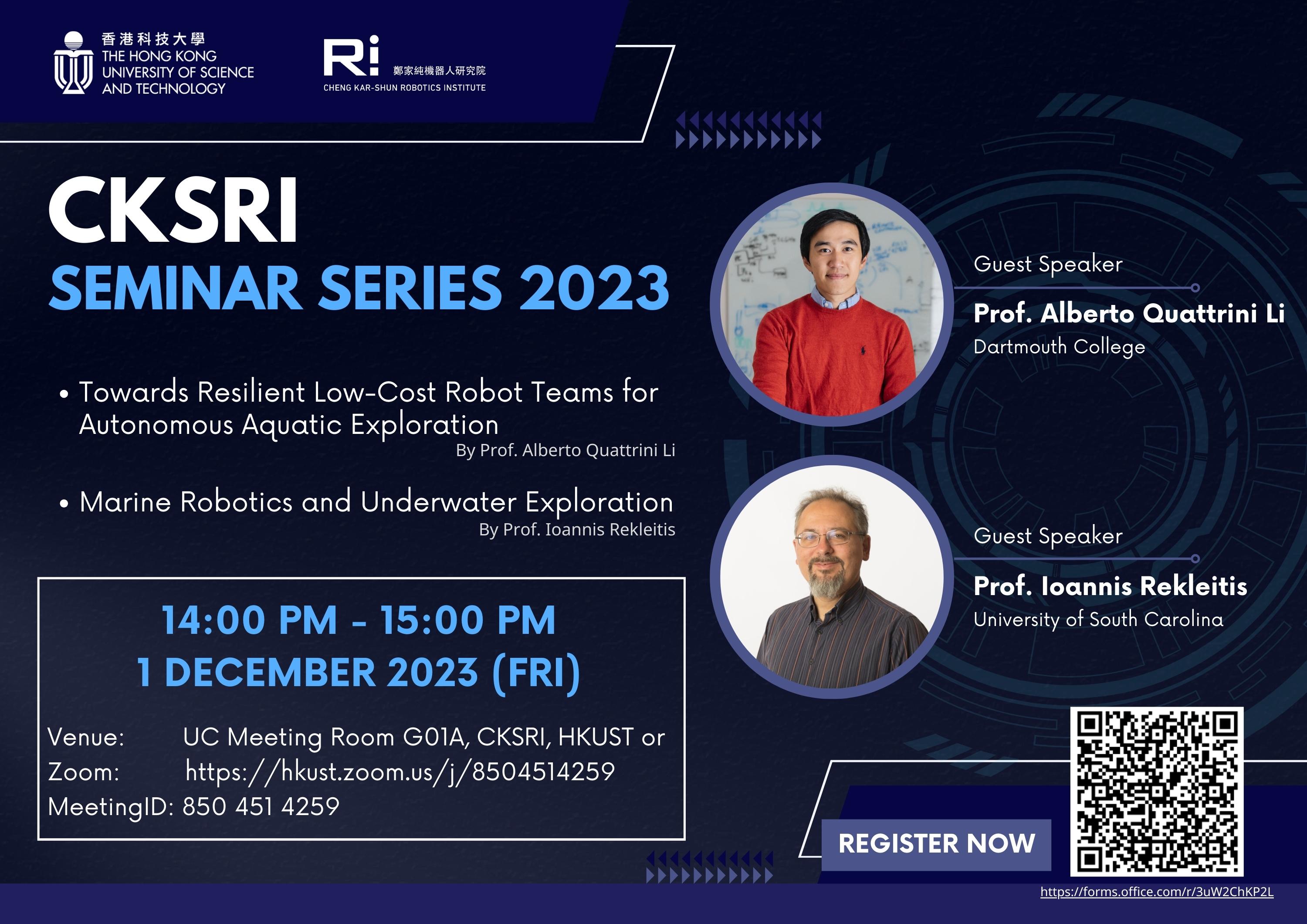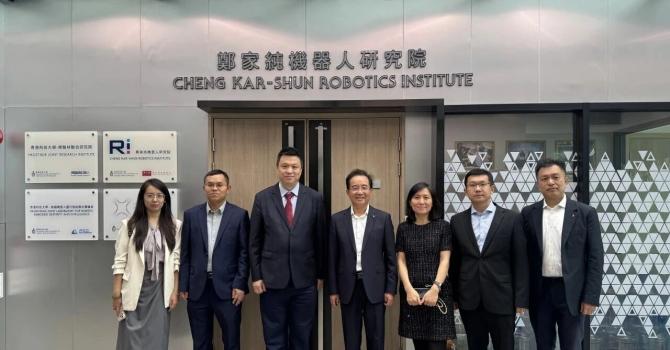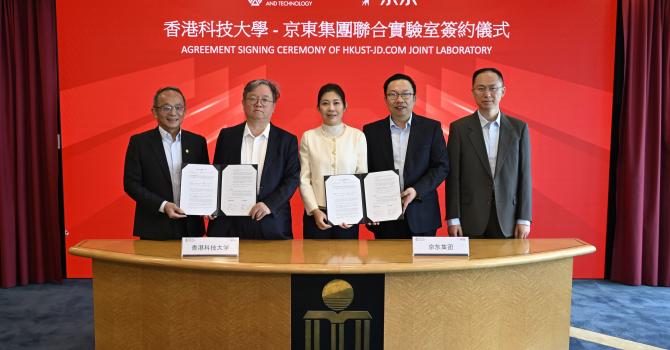CKSRI Seminar Series 2023 "Towards Resilient Low-Cost Robot Teams for Autonomous Aquatic Exploration” and "Marine Robotics and Underwater Exploration"

Thank you to everyone who joined the CKSRI Seminar!
We are honoured to have Prof. Alberto Quattrini Li, Assistant Professor Department of Computer Science at Dartmouth College and co-director of the Dartmouth Reality and Robotics Lab and Prof. Ioannis Rekleitis, Associate Professor in the Department of Computer Science and Engineering, University of South Carolina, as our distinguished speaker.
Abstract:
“Towards Resilient Low-Cost Robot Teams for Autonomous Aquatic Exploration” by Prof. Alberto Quattrini Li
Why is the aquatic world still mostly unexplored despite its importance for the blue economy and the great progress in autonomous robotics? This talk delves into some of the main challenges that limit robots in such a task and solutions we designed towards resilient low-cost aquatic robot teams. First, I will talk about photometric stereo algorithms for low-cost perception that improved the situational awareness of underwater robots. Second, I will present exploration strategies that explicitly consider uncertainties and constraints allowing robots to effec9vely operate in the real world. Then, I will touch on enabling low-cost manipula9on through hardware/software co-design for underwater construction. Each part will include discussion of field experiments and lessons learned. The talk will conclude with a discussion on some of the open problems and current work to achieve the long-term goal of a ubiquitous collaborative multi-agent/multi-robot system that can support large scale aquatic applications, such as environmental monitoring or archaeological exploration.
"Marine Robotics and Underwater Exploration" by Prof. Ioannis Rekleitis
The last few years, robots have moved from the pages of science fiction books into our everyday reality. Currently, robots are utilized in entertainment, scientific exploration, manufacturing, and household maintenance. While the above advances were made possible by recent improvements in sensors, actuators, and computing elements, the research of today is focused on the computational aspects of robotics. In particular, methodologies for utilizing the vast volumes of data that can be generated by a robotic mission, together with techniques that would allow a robot to respond adequately in unforeseeable circumstances are the challenges of tomorrow. This talk presents an overview of algorithmic problems related to marine robotics, with the particular focus on exploration and mapping of underwater cave. I will talk about vision-based state estimation and mapping of shipwrecks, underwater caves, and coral reefs. Results on machine learning approaches for coral classification and caveline detection will be discussed. In addition, a short overview of current projects will be discussed. The work that I will present has a strong algorithmic flavour, while it is validated in real hardware. Experimental results from several testing campaigns will be presented.
Short Bio:
Prof. Alberto Quattrini Li
Alberto Quattrini Li is an assistant professor in the Department of Computer Science at Dartmouth College and co-director of the Dartmouth Reality and Robotics Lab. His main research (currently funded by the National Science Foundation, including an NSF CAREER) covers autonomous mobile robotics and active perceptions, applied to the aquatic domain, dealing with problems that span from multirobot exploration and coverage to multisensor fusion based state estimation. He has worked with many ground and marine robots, including Autonomous Surface Vehicles and Autonomous Underwater Vehicles. He provided service to the research community, including being an associate editor and part of program committees of multiple robotics and AI conferences, such as the IEEE International Conference on Robotics and Automation (ICRA), the IEEE/RSJ International Conference on Intelligent Robotics and Systems (IROS), IEEE Robotics Automation LePers (RA-L), the International Joint Conference on Artificial Intelligence (IJCAI), AAAI Association for the Advancement of Artificial Intelligence, IEEE Multi-agent and Multi-robot symposium (MRS), Conference on Robot Learning (CORL), among others. He was a postdoctoral fellow and research assistant professor in the Autonomous Field Robotics Laboratory (AFRL), led by Professor Ioannis Rekleitis, in University of South Carolina from 2015 to 2018. During 2014, he was a visiting PhD student in the Robotic Sensor Networks Lab, directed by Professor Volkan Isler, at the Department of Computer Science and Engineering, University of Minnesota. He received a M.Sc. (2011) and a Ph.D. (2015) in Computer Science and Engineering from Politecnico di Milano, working with Professor Francesco Amigoni.
Prof. Ioannis Rekleitis
Ioannis Rekleitis is an Associate Professor at the Computer Science and Engineering Department, University of South Carolina. He was an Adjunct Professor at the School of Computer Science, McGill University 2007-2020. Between 2004 and 2007 he was a visiting fellow at the Canadian Space Agency. During 2004 he was at McGill University as a Research Associate in the Centre for Intelligent Machines with Professor Gregory Dudek in the Mobile Robotics Lab (MRL). Between 2002 and 2003, he was a Postdoctoral Fellow at the Carnegie Mellon University in the Sensor Based Planning Lab with Professor Howie Choset. He was granted his Ph.D. from the School of Computer Science, McGill University, Montreal, Canada in 2002 under the supervision of Professors Gregory Dudek and Evangelos Milios. Thesis title: "Cooperative Localization and Multi-Robot Exploration". His Research has focused on mobile robotics and in particular in the area of cooperating intelligent agents with application to multi-robot cooperative localization, mapping, exploration and coverage. Field deployments of the robotics systems provide valuable feedback for the developed algorithms. His interests extend to computer vision, machine learning, and sensor networks. He has worked with underwater, surface, terrestrial, aerial, and space robots. Ioannis Rekleitis has published more than one hundred journal and conference papers. His work can be found online at: http://www.cse.sc.edu/~yiannisr/



